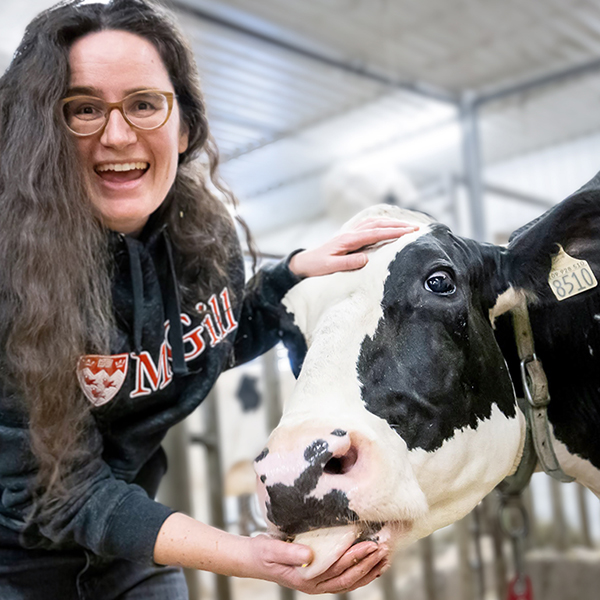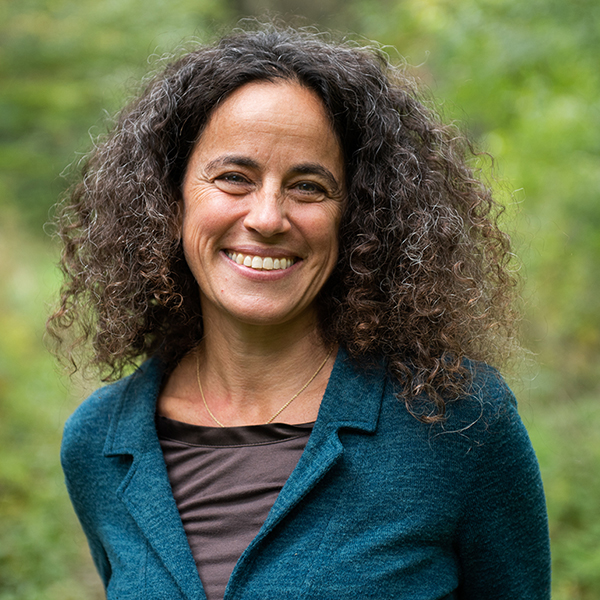At the beginning of 2017, Principal Suzanne Fortier, BSc’72, PhD’76, flew to Davos to take part in the World Economic Forum’s annual meeting. She brought along some carefully selected McGill colleagues.
The Forum’s annual meeting attracts hundreds of the world’s most influential people – heads of state, CEOs, the leaders of major NGOs. You might find yourself rubbing shoulders with Bono or Bill Gates. Fortier was there as the only Canadian member of the Global University Leaders Forum, a WEF-affiliated group that includes the presidents of 27 of the world’s top universities.
She used the opportunity to showcase McGill’s growing prominence in the field of environmental sustainability, hosting an event that featured three of McGill’s rising stars in that area – Andrew Gonzalez and Graham MacDonald from the Faculty of Science, and Elena Bennett from the Faculty of Agricultural and Environmental Sciences.
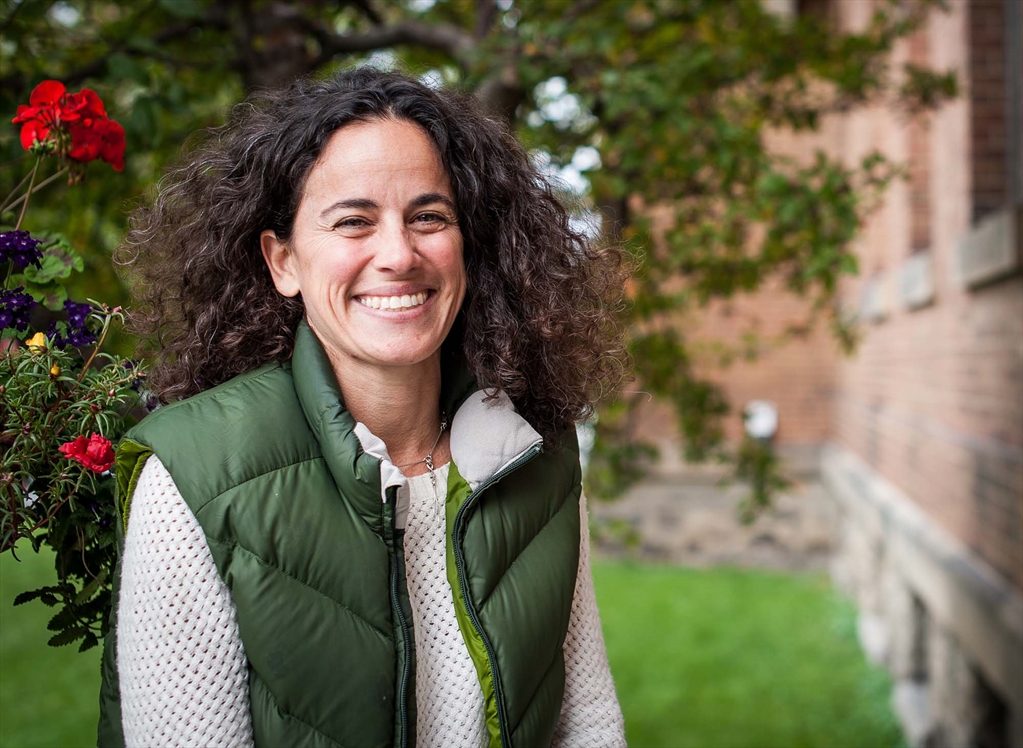
“Representing McGill was a phenomenal experience,” says MacDonald, BA’06, MSc’08, PhD’13, an assistant professor of geography. His research explores the social, environmental and economic impact of changing food systems, including agricultural production but also food distribution and consumer demand. “I found it fascinating to engage in that process with policy makers and industry leaders. The World Economic Forum brings together people from different sectors and countries to talk about some of the world’s greatest challenges.”
Many of those challenges revolve around the question of how to forge a sustainable future for the planet and its occupants.
The UN’s 2030 Agenda for Sustainable Development defines 17 goals that address social, environmental and economic sustainability issues, and each of those goals involves a variety of factors. The abundance of approaches to, and forms of, sustainability issues – social, ecological, infrastructural and economic, among others – attests to the complexity of the concept itself.
A collaborative approach
And this complexity demands a new kind of research – the kind facilitated by the McGill Sustainability Systems Initiative (MSSI), launched a little over a year ago.
“Many McGill research teams are working directly on sustainability questions, but in separate domains, so the MSSI creates a hub where people from different disciplines can develop collaborative projects,” says Heather McShane, PhD’13, the MSSI’s program director and catalyst-in-chief.
“We help people to connect with others they wouldn’t normally meet, building a community for exchanging ideas and developing new and avant-garde collaborative projects.” McShane and her team have organized workshops, symposia, and a speaker series to bring together researchers. A series of “lightning talks,” brief presentations by researchers from different disciplines about their work, proved to be particularly popular. Mining and materials engineering professor George Demopoulos says he welcomes the opportunity to work more closely with colleagues from different disciplines. “The MSSI is having a huge impact.”
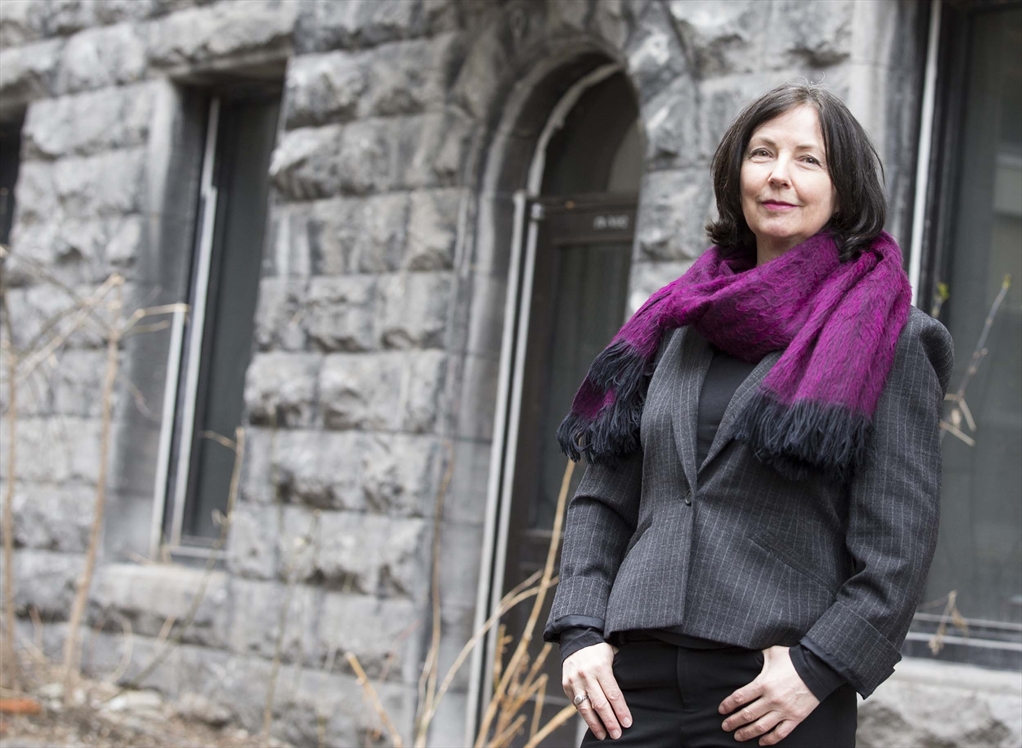
More than 150 McGill professors have become MSSI members and the initiative has attracted affiliate members from outside the University. McShane and the MSSI team are casting a wide net – the connections they are building involve partners from the natural sciences, engineering, public health, the social sciences, law, the humanities and management. The MSSI reports to the deans of three separate faculties – agricultural and environmental sciences, engineering, and science.
A comprehensive consultation process with MSSI members led to the identification of three themes with which to start: sustaining landscapes, creating sustainable materials, and adapting urban environments. And, because cross-disciplinary projects are notoriously difficult to fund through traditional granting agencies, McGill has given the MSSI enough money to provide seed funding for promising initiatives within these themes.
Why green spaces matter
Happily, McGill can already boast an impressive body of world-leading sustainability research upon which to build. Take, for instance, biology professor Andrew Gonzalez’s project that explores urban networks of interlacing green spaces or “green corridors,” looking at how they function, what they need to prosper, and what benefits they offer to urbanites.
“Many cities around the world are realizing the importance of green spaces, which are critical to biodiversity, and the benefits, including health benefits, they bring,” says Gonzalez, holder of the Canada Research Chair in Biodiversity Science and the Liber Ero Chair in Conservation Biology. Those benefits include improved air quality and essential recreational space.
A recent initiative in Montreal used Gonzalez’s models to plant trees, shrubs and other greenery in order to mitigate pockets of extreme heat known as urban heat islands – localized areas where temperatures soar to dangerous levels. Gonzalez is also working with the city of Montreal to produce a model of its green spaces, taking into account climate change and urban sprawl, for the next 35 to 50 years. “Without a clear policy in place, green space will be reduced and more fragmented, so we need to plan now to diminish the impact of how we use our land and the ecosystems,” he stresses.
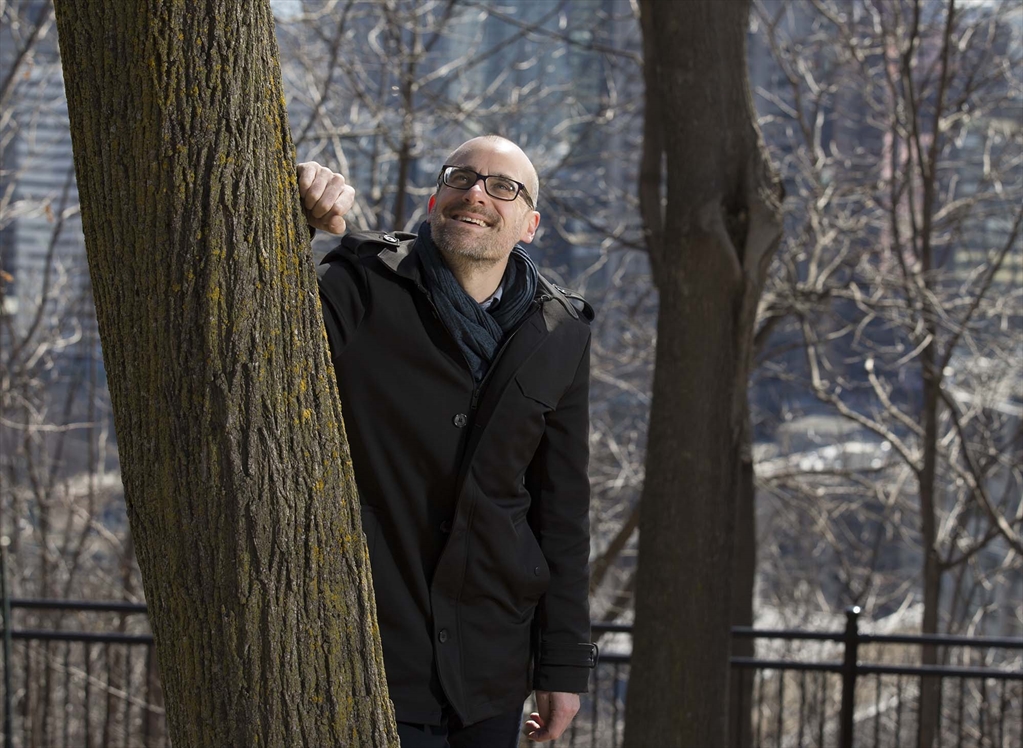
Gonzalez is co-leader, with assistant professor of geography Kevin Manaugh, MUP’09, PhD’13, and assistant professor of urban planning David Wachsmuth, BA’04, of the MSSI’s Adapting Urban Environments theme. One of its projects involves creating a Montreal Living Lab.
“We have new tools that allow us to take the pulse of a city from a complex living systems or ecological perspective,” says Gonzalez. The project will create a public online dashboard that will provide a range of real-time information on Montreal’s sustainability factors. The team is also collaborating with the municipal government and other non-academic partners to define these factors – environmental, social, economic, among others – and determine how they can best be measured and managed.
Ensuring sustainable urban development is one thing; managing multifunctional landscapes offers a different set of challenges. Associate professor of natural resource sciences Elena Bennett recently completed the “Montérégie Connection” project, a cross-disciplinary initiative focusing on sustainability and multifunctional ecosystem management in the Montérégie region south of Montreal.
“It can be a challenge to make decisions about land use while considering multiple issues,” she says. “Say you have to make an agricultural management decision about a piece of land, but that also affects hunting and maple syrup production and recreation. So the project was about encouraging and developing decision-making processes that take multiple benefits into account.”
Bennett and her partners, including Gonzalez, worked closely with the communities lying within the Montérégie region to generate information that would be useful for policy development. The effort proved successful enough that Bennett has submitted a grant proposal to expand the project to seven different landscapes across Canada.
Leery of locusts
Environmental management also concerns assistant professor of geography Brian Robinson, who is collaborating with researchers internationally to identify approaches for reducing locust swarms in Australia, Senegal, and China.
The locust is a type of grasshopper that is normally solitary and sedentary, but which, under certain conditions, becomes gregarious and nomadic. “One of the things that influences the switch between a single little grasshopper and unmanageable swarms of locusts that destroy crop fields and cause famine is the quality of the grassland they inhabit,” says Robinson, co-leader, with Bennett and civil engineering professor Laxmi Sushama, of the MSSI’s Sustaining Landscapes theme.
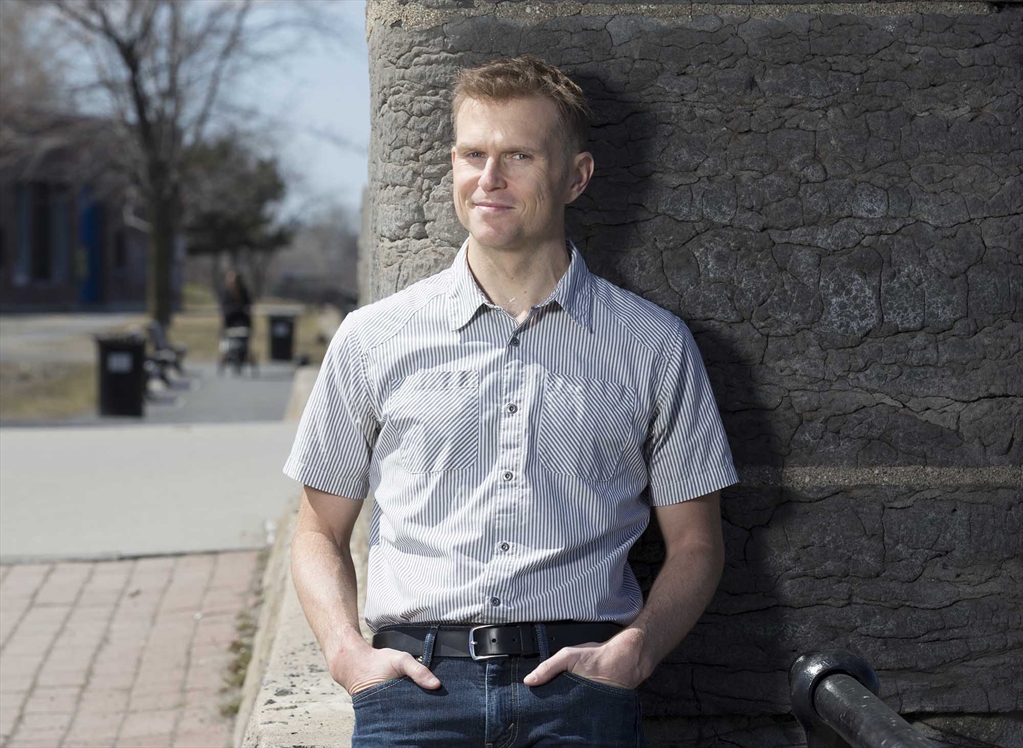
In one particularly devastating outbreak, locusts caused $2.5 billion in crop damage in Africa between 2000 and 2003. “We’ve found that more degraded grasslands push grasshoppers into becoming swarming locusts, so if you stop grasslands from degrading, you help reduce the probability of these outbreaks,” says Robinson. His research focuses on how rangeland management and policies could mitigate swarms. China has a top-down approach with a centralized authority; in Senegal, villages have much greater control over their local regions; and Australia has a strong private property system.
“These different social and property rights situations have dramatic implications for managing degradation, so our comparative work investigates how locust problems can be addressed in these contexts.” Robinson’s collaborators explore such things as locust biology and nutrition, and in May he joined them at Arizona State University to help launch the Global Locust Initiative. “I’ve always been interested in trying to understand the big picture, and but I can’t do it by myself,” he says. “If my work is to affect policy makers, I have to integrate it with other disciplines.”
E-waste graveyards
Influencing policy is an important objective of sustainability research. As a member of The Lancet Commission on pollution and health, associate professor of natural resource sciences Niladri Basu co-authored a study that was the first to show pollution’s global health impact.
“The few types of pollution we measured lead to over nine million premature deaths globally per year. That’s three times more than AIDS, tuberculosis and malaria combined, and 15 times more than all forms of violence and wars,” says Basu, who holds the Canada Research Chair in Environmental Health Sciences. “And pollution disproportionately kills the poor and people in the developing world, most often through unsafe air quality and contaminated water and food.” Cleaning up polluting industries and activities not only improves the health of people and the environment, he notes – it will also help economies to thrive.
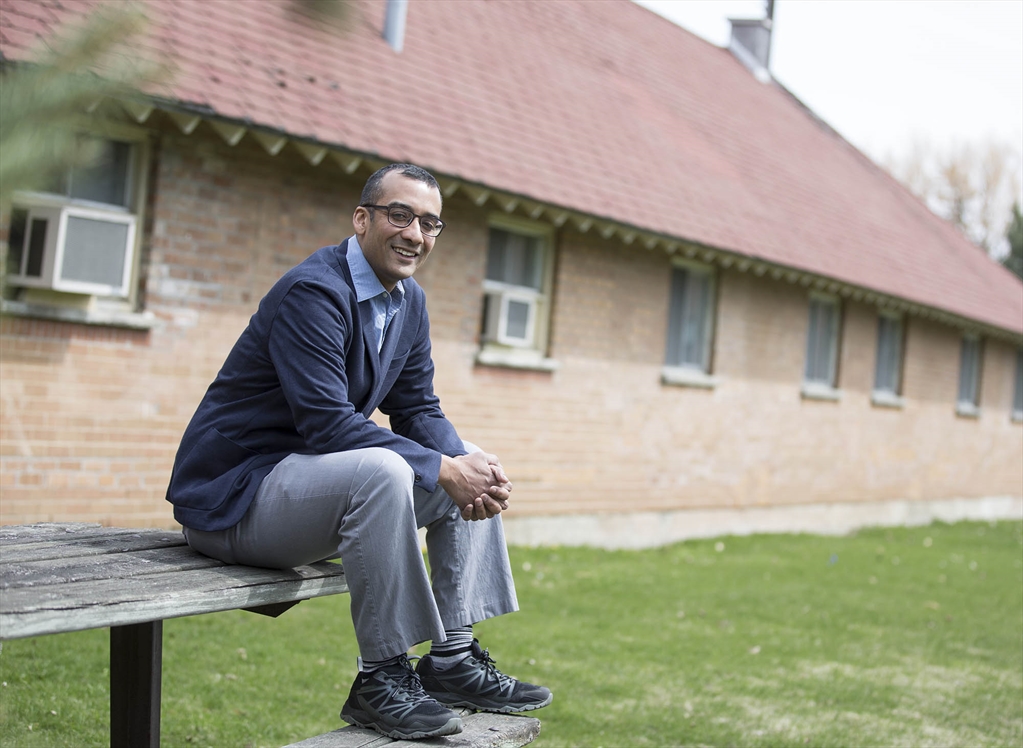
Basu’s research includes tracking the health, social and economic consequences of mercury pollution and e-waste. “We are addicted to our electronic gadgetry, always upgrading to new models,” he says. But the discarded gadgets become waste for export, mainly to Africa, which has witnessed a huge upsurge in e-waste flowing from North America and Europe. The port at Accra, Ghana, receives container ships filled with junked computers destined for the Agbogbloshie e-waste dump, the world’s largest e-waste graveyard.
“At sites like this, impoverished workers go through heaps of discarded computers and related items, and pick these materials apart with their fingers or use very crude methods like coarse acid burning to liberate key elements that can be recycled and sold,” says Basu, whose research has taken him to Agbogbloshie and similar dumps. These e-waste “miners” are subject to a range of health risks, breathing carcinogenic fumes and being exposed to highly toxic chemicals. But, Basu notes, there can be a solution. “We should be designing our electronic products – phones, computers, screens fridges, microwaves, toasters – so they’re designed for life, and when they do break down they can be recycled easily.”
Basu is a co-leader of the Creating Sustainable Materials theme, along with Demopoulos, MSc’78, PhD’82, and associate professor of chemistry Audrey Moores; the group has determined to focus its efforts on the materials used in alternative energy production, such as those used in developing photovoltaic cells for collecting solar power. “We’re looking at these materials across their life cycle, from their design and development, their manufacture and application, and their eventual disposal or recovery,” says Basu. “This sector is undergoing explosive growth, so now is the time to ensure that the decisions we’re making are responsible ones. We don’t want to find out in 10 years that we’ve further contaminated the planet. We want to make products that are ‘benign by design.’”
That’s the driving force behind much of the research done by Demopoulos, the Gerald G. Hatcher Chair in the Department of Mining and Materials Engineering. He and his team focus on “new energy materials” for both solar power and lithium ion batteries (widely used in electric cars and mobile phones).
“A lot of clean energy technologies have certain skeletons in their closet,” says Demopoulos. The cobalt that is widely used for lithium ion batteries is associated with dangerous mining practices and child labour. Lead, a highly toxic metal, is often used in solar cells. Demopoulos is exploring the use of less problematic materials. For example, he is examining the use of iron lithium silicate, a material composed of ingredients that are both readily available and non-toxic, for lithium ion batteries. “When we develop a new material, we try to solve a problem,” says Demopoulos. “We don’t want to create a new problem.”
Moores, McGill’s Canada Research Chair in Green Chemistry, leads research efforts with a similar goal. “When industry is manufacturing chemicals it uses catalysts to accelerate processes, or enable them to happen at lower temperatures, or more selectively, with less waste,” she explains. “So catalysts are very important for sustainability, because they help reduce the global footprint of a process.” Many catalytic processes rely on toxic heavy metals, so one line of her research is to reduce reliance on these metals. Her team is also looking for ways to shrink the footprint of catalytic processes – by using magnetic metal particles that can then be recovered easily to avoid separation steps, which cost energy, time, and money.
Discussions around the importance of sustainability research often involve dire predictions about the social and environmental dystopia that would result from inaction – and that bleak messaging can create a numbing effect. Bennett’s team, along with collaborators from South Africa and Sweden, are adopting a different approach, one that emphasizes hope.
The Seeds of a Good Anthropocene project has collected more than 500 examples of projects that are transforming some piece of the world for the better. These “Bright Spots” range from urban farming initiatives in Japan to efforts to protect rare endemic species in New Zealand.
The project is building a database for analyzing what makes some initiatives successful, while helping researchers to develop better scenarios of alternative futures – not predictions so much as a range of possibilities.
McShane expects that the MSSI will be playing an important role in exploring some of those possibilities. “We’re creating a hub that will be useful in our community and globally,” she says. “So when people think about sustainability research, they will think of McGill.”

